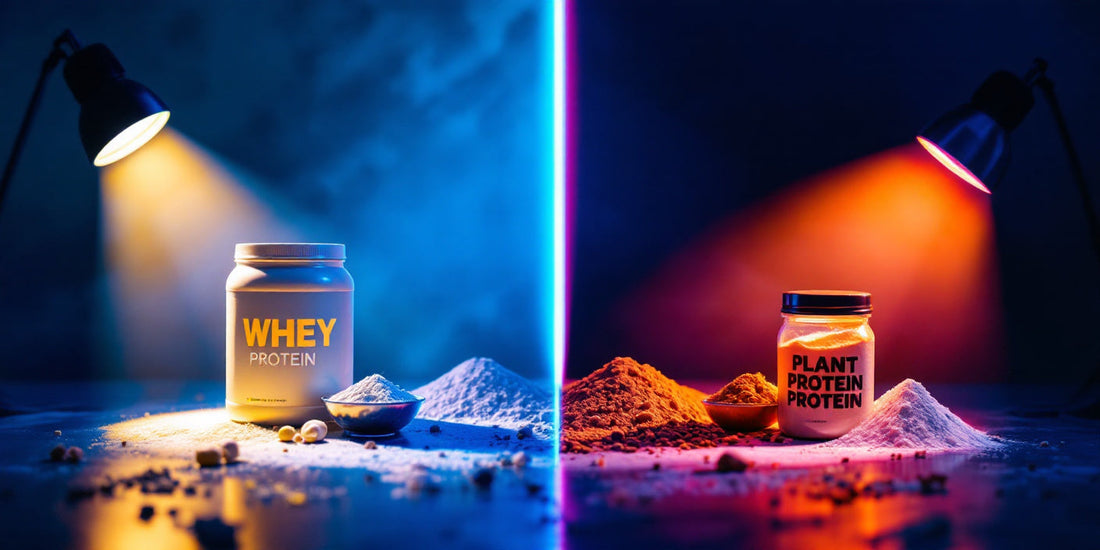

Whey vs Plant Protein: Which One Is Better for You?
Table of Contents
When it comes to protein powders, the age-old debate of whey vs plant protein has taken over the fitness industry. Whether you're a gym enthusiast, a vegan, or simply someone looking to boost their protein intake, choosing between whey vs plant protein can feel overwhelming.
So, in this blog, we'll break down everything you need to know about whey vs plant protein — from their benefits to differences, and which one is better suited for your body and fitness goals.
What Is Whey Protein?
Whey protein is derived from milk during the cheese-making process. It is the liquid part that separates from the curd, and once processed, it becomes the powdered whey protein you commonly see in stores. This type of protein is popular among athletes, bodybuilders, and fitness enthusiasts because of its fast absorption rate and high protein content.
Whey protein contains all nine essential amino acids, making it a complete protein . This means it provides your body with the essential nutrients it needs for muscle repair, growth, and recovery.

What Is Plant Protein?
Plant protein , on the other hand, is sourced from plants such as peas, hemp, brown rice, soy, or chia seeds. It has gained immense popularity, especially among vegans, vegetarians, and those who have lactose intolerance.
Plant protein can also be a complete protein, depending on its source or blend. For example, a combination of pea and rice protein provides all nine essential amino acids, similar to whey protein.
So now that you know the basics, let's dig deeper into whey vs plant protein and find out which one is better for your body and fitness goals.
Whey vs Plant Protein
Feature |
Whey Protein |
Plant Protein |
Complete Protein (All 9 Amino Acids) |
Yes |
Yes (if blended) |
Fast Absorption |
Yes |
No |
Suitable for Vegans |
No |
Yes |
Contains Dairy |
Yes |
No |
Easily Digestible |
No (for lactose intolerant) |
Yes |
Muscle Building |
Yes |
Yes |
Eco-Friendly |
No |
Yes |
High Fiber Content |
No |
Yes |
Cost-Effective |
Yes |
No |
Supports Fat Loss |
Yes |
Yes |
Benefits of Whey Protein
Fast Absorption Rate
Whey protein is quickly absorbed by the body, making it ideal for post-workout recovery.
Muscle Building
With a high concentration of amino acids, especially leucine, whey protein is excellent for muscle growth and repair.
Weight Management
Studies have shown that whey protein can help suppress appetite, promote fat loss, and maintain lean muscle mass.
Immune Boosting
Whey protein contains immunoglobulins and lactoferrin, which help boost immunity.
Benefits of Plant Protein
Gut-Friendly
Plant protein is easier on the digestive system, especially for those who are lactose intolerant or have dairy allergies.
Rich in Fiber
Many plant-based proteins also contain fiber, which helps improve digestion and gut health.
Anti-Inflammatory Properties
Plant protein tends to have natural anti-inflammatory benefits, making it ideal for overall health.
Sustainable Option
Choosing plant protein has a lower environmental impact, making it a more sustainable and eco-friendly option.
Nutritional Differences: Whey vs Plant Protein
Let's now compare the nutritional profile of whey vs plant protein to give you a better understanding.
- Protein Content: Whey protein typically contains around 20-25g of protein per scoop , while plant protein can range from 15-22g depending on the source.
- Amino Acid Profile: Whey protein is naturally a complete protein, but plant protein may need to be blended to achieve the same.
- Digestibility: Whey protein digests faster, while plant protein digests slower, providing longer satiety.
- Allergens: Whey protein contains dairy, while plant protein is usually allergen-free (except soy for some people).
Scientific Research on Whey vs Plant Protein
Numerous studies have compared the muscle-building potential of whey vs plant protein. According to a study published in the Journal of the International Society of Sports Nutrition , both whey and plant protein showed similar effects on muscle protein synthesis when consumed post-workout.
Another research conducted in Nutrients Journal (2020) found that individuals who consumed plant protein with a complete amino acid profile had muscle growth and recovery rates similar to those who consumed whey protein.
However, if you are aiming for rapid muscle recovery, whey protein may have a slight edge due to its fast absorption rate.

Is One Really Better Than the Other?
The truth is, when it comes to whey vs plant protein, there is no definitive winner. It all boils down to your personal preferences, dietary restrictions, and fitness goals.
If your goal is rapid muscle gain and fast recovery, whey protein might be your best bet. However, if you are health-conscious, vegan, or have dietary restrictions, plant protein can be equally effective in supporting muscle growth and overall health.
Studies have shown that whey vs plant protein perform similarly when consumed in adequate amounts. So, whether you choose whey vs plant protein, the key is to stay consistent with your protein intake and pair it with a balanced diet and regular exercise.
Final Thoughts
In the never-ending debate of whey vs plant protein, the best choice comes down to your body’s needs and your lifestyle. If you're someone who values fast recovery and maximum muscle growth, go for whey protein. But if you want something clean, sustainable, and plant-based, plant protein will not disappoint you.
Both proteins have their unique advantages, and neither is superior to the other. So, whether you go for whey vs plant protein, make sure to stay consistent with your diet, training, and recovery to achieve your fitness goals.

















